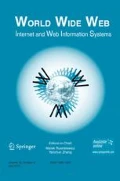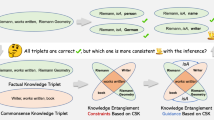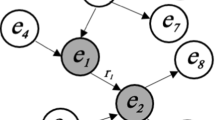Abstract
Representation learning techniques for knowledge graphs (KGs) are crucial for constructing knowledge-driven decisions in complex network data application scenarios. Most existing methods focus mainly on structured information, ignoring the important value of rich ontology information constraints and complements, however, ontology information is the key for building knowledge-driven decision-making processes. In this paper, we propose a novel ontology information constrained knowledge representation learning model, TransO, which can efficiently model relations explicitly and seamlessly incorporate rich ontology information to improve model performance and maintain low model complexity. Moreover, specific constraint strategies are proposed for entity types, relations, and hierarchical information to effectively implement reasoning and completion of KGs and construct knowledge-driven decisions that are more consistent with the logic of human knowledge in complex network applications. The experimental tasks of link prediction and triple classification are performed on two public datasets. The experimental results demonstrate the effectiveness of our proposed method with better performance than state-of-the-art methods.







Similar content being viewed by others
References
Bollacker, K., Evans, C., Paritosh, P., Sturge, T., Taylor, J.: Freebase: A collaboratively created graph database for structuring human knowledge. In: Proceedings of the 2008 ACM SIGMOD International Conference on Management of Data, SIGMOD’08, pp. 1247–1250. Association for Computing Machinery (2008)
Bordes, A., Usunier, N., Garcia-Duran, A., Weston, J., Yakhnenko, O.: Translating embeddings for modeling multi-relational data. In: Proceedings of the 26th International Conference on Neural Information Processing Systems, NIPS’13, pp. 2787—2795. Curran Associates Inc. (2013)
Cai, T., Li, J., Mian, A., Sellis, T., Yu, J.: Target-aware holistic influence maximization in spatial social networks. IEEE Transactions on Knowledge and Data Engineering (2020)
Chen, J., Zhong, M., Li, J., Wang, D., Qian, T., Tu, H.: Effective deep attributed network representation learning with topology adapted smoothing. IEEE Transactions on Cybernetics PP (2021)
Fan, M., Zhou, Q., Chang, E., Zheng, F.: Transition-based knowledge graph embedding with relational mapping properties. In: Proceedings of the 28th Pacific Asia Conference on Language, Information and Computing, PACLIC’14, pp. 328–337. Department of Linguistics, Chulalongkorn University (2014)
Guo, S., Wang, Q., Wang, B., Wang, L., Guo, L.: Sse: Semantically smooth embedding for knowledge graphs. IEEE Transactions on Knowledge and Data Engineering 29(4), 884–897 (2017)
Han, X., Cao, S., Xin, L., Lin, Y., Liu, Z., Sun, M., Li, J.: Openke: An open toolkit for knowledge embedding. In: Proceedings of the 2018 Conference on Empirical Methods in Natural Language Processing, EMNLP’18, pp. 139–144. Association for Computational Linguistics (2018)
Hao, J., Chen, M., Yu, W., Sun, Y., Wang, W.: Universal representation learning of knowledge bases by jointly embedding instances and ontological concepts. In: Proceedings of the 25th ACM SIGKDD International Conference on Knowledge Discovery & Data Mining, KDD’19, pp. 1709–1719. Association for Computing Machinery (2019)
Huang, Y., Zhao, F., Gui, X., Jin, H.: Path-enhanced explainable recommendation with knowledge graphs. World Wide Web 24(5), 1769–1789 (2021)
Ji, G., He, S., Xu, L., Liu, K., Zhao, J.: Knowledge graph embedding via dynamic mapping matrix. In: Proceedings of the 53rd Annual Meeting of the Association for Computational Linguistics and the 7th International Joint Conference on Natural Language Processing, ACL’15, pp. 687–696. Association for Computational Linguistics (2015)
Ji, S., Pan, S., Cambria, E., Marttinen, P., Yu, P.S.: A survey on knowledge graphs: Representation, acquisition, and applications. IEEE Transactions on Neural Networks and Learning Systems pp. 1–21 (2021)
Kazemi, S.M., Poole, D.: Simple embedding for link prediction in knowledge graphs. In: Proceedings of the 32nd Conference on Neural Information Processing Systems, NeurIPS’18, pp. 4284–4295. Curran Associates, Inc. (2018)
Li, Z., Wang, X., Li, J., Zhang, Q.: Deep attributed network representation learning of complex coupling and interaction. Knowledge-Based Systems 212, 106618 (2021)
Lin, Y., Liu, Z., Sun, M., Liu, Y., Zhu, X.: Learning entity and relation embeddings for knowledge graph completion. In: Proceedings of the Twenty-Ninth AAAI Conference on Artificial Intelligence, AAAI’15, pp. 2181–2187. AAAI Press (2015)
Lv, X., Hou, L., Li, J., Liu, Z.: Differentiating concepts and instances for knowledge graph embedding. In: Proceedings of the 2018 Conference on Empirical Methods in Natural Language Processing, EMNLP’18, pp. 1971–1979. Association for Computational Linguistics, Brussels, Belgium (2018)
Nickel, M., Rosasco, L., Poggio, T.: Holographic embeddings of knowledge graphs. In: Proceedings of the Thirtieth AAAI Conference on Artificial Intelligence, AAAI’16, pp. 1955–1961. AAAI Press (2016)
Nickel, M., Tresp, V., Kriegel, H.P.: A three-way model for collective learning on multi-relational data. In: Proceedings of the 28th International Conference on Machine Learning, ICML’11, pp. 809–816. Omnipress (2011)
Niu, L., Fu, C., Yang, Q., Li, Z., Chen, Z., Liu, Q., Zheng, K.: Open-world knowledge graph completion with multiple interaction attention. World Wide Web 24(1), 419–439 (2021)
Shen, Y., Li, Z., Wang, X., Li, J., Zhang, X.: Datatype-aware knowledge graph representation learning in hyperbolic space. In: Proceedings of the 30th ACM International Conference On Information & Knowledge Management, CIKM’21, pp. 1630–1639. Association for Computing Machinery (2021)
Socher, R., Chen, D., Manning, C.D., Ng, A.Y.: Reasoning with neural tensor networks for knowledge base completion. In: Proceedings of the 26th International Conference on Neural Information Processing Systems, NIPS’13, pp. 926–934. Curran Associates Inc. (2013)
Trouillon, T., Welbl, J., Riedel, S., Gaussier, E., Bouchard, G.: Complex embeddings for simple link prediction. In: Proceedings of the 33rd International Conference on International Conference on Machine Learning, ICML’16, pp. 2071–2080. JMLR.org (2016)
Wan, G., Du, B., Pan, S., Wu, J.: Adaptive knowledge subgraph ensemble for robust and trustworthy knowledge graph completion. World Wide Web 23(1), 471–490 (2020)
Wang, Q., Wang, B., Guo, L.: Knowledge base completion using embeddings and rules. In: Proceedings of the 24th International Conference on Artificial Intelligence, IJCAI’15, pp. 1859–1865. AAAI Press (2015)
Wang, Z., Zhang, J., Feng, J., Chen, Z.: Knowledge graph embedding by translating on hyperplanes. In: Proceedings of the Twenty-Eighth AAAI Conference on Artificial Intelligence, AAAI’14, pp. 1112–1119. AAAI Press (2014)
Wang, Q., Mao, Z., Wang, B., Guo, L.: Knowledge graph embedding: A survey of approaches and applications. IEEE Transactions on Knowledge and Data Engineering 29(12), 2724–2743 (2017)
Xie, R., Liu, Z., Sun, M.: Representation learning of knowledge graphs with hierarchical types. In: Proceedings of the 25th International Joint Conference on Artificial Intelligence, IJCAI’16, pp. 2965–2971. International Joint Conferences on Artificial Intelligence Organization (2016)
Xie, Y., Yu, B., Lv, S., Zhang, C., Wang, G., Gong, M.: A survey on heterogeneous network representation learning. Pattern Recognition 116, 107936 (2021)
Xue, G., Zhong, M., Li, J., Chen, J., Zhai, C., Kong, R.: Dynamic network embedding survey. arxiv:abs/2103.15447 (2021)
Yang, Y., Guan, Z., Li, J., Zhao, W., Cui, J., Wang, Q.: Interpretable and efficient heterogeneous graph convolutional network. IEEE Transactions on Knowledge and Data Engineering (2021)
Yang, C., Xiao, Y., Zhang, Y., Sun, Y., Han, J.: Heterogeneous network representation learning: A unified framework with survey and benchmark. IEEE Transactions on Knowledge and Data Engineering pp. 1–1 (2020)
Yang, B., Yih, S.W.t., He, X., Gao, J., Deng, L.: Embedding entities and relations for learning and inference in knowledge bases. In: Proceedings of the third International Conference on Learning Representations, ICLR’15, pp. 809–816 (2015)
Zhang, F., Wang, X., Li, Z., Li, J.: Transrhs: A representation learning method for knowledge graphs with relation hierarchical structure. In: Proceedings of the Twenty-Ninth International Joint Conference on Artificial Intelligence, IJCAI’20, pp. 2987–2993. International Joint Conferences on Artificial Intelligence Organization (2020)
Zhang, Z., Zhuang, F., Qu, M., Lin, F., He, Q.: Knowledge graph embedding with hierarchical relation structure. In: Proceedings of the 2018 Conference on Empirical Methods in Natural Language Processing, EMNLP’18, pp. 3198–3207. Association for Computational Linguistics (2018)
Zheng, S., Guan, D., Yuan, W.: Semantic-aware heterogeneous information network embedding with incompatible meta-paths. World Wide Web pp. 1–21 (2021)
Acknowledgements
This work is supported by the National Key R&D Program of China (2020AAA0108504) and the National Natural Science Foundation of China (61972275).
Author information
Authors and Affiliations
Corresponding author
Ethics declarations
Conflicts of interest
The authors declare that they have no known competing financial interests or personal relationships that could have appeared to influence the work reported in this paper.
Additional information
Zhao Li and Xin Liu contributed equally to this work.
This article belongs to the Topical Collection: Special Issue on Decision Making in Heterogeneous Network Data Scenarios and Applications
Guest Editors: Jianxin Li, Chengfei Liu, Ziyu Guan, and Yinghui Wu
Rights and permissions
About this article
Cite this article
Li, Z., Liu, X., Wang, X. et al. TransO: a knowledge-driven representation learning method with ontology information constraints. World Wide Web 26, 297–319 (2023). https://doi.org/10.1007/s11280-022-01016-3
Received:
Revised:
Accepted:
Published:
Issue Date:
DOI: https://doi.org/10.1007/s11280-022-01016-3




